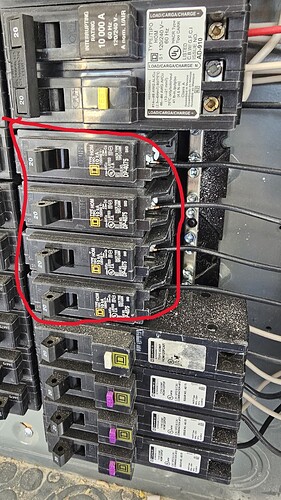Just did a new-construciton home, permitted in 2025. The city says they have adopted the newest version of the Florida Building Code, which follows the NEC.
The builder has GFCI outlets installed in kitchen and baths, but I thought they had to have AFCI in all 20 amp circuits too? I don’t do many new homes, but In those I do, I usually find dual AFCI/GFCI breakers for the kitchen.
They DID put in a dual GFCI/AFCI breaker for the Refrigerator and microwave.
The 20 amp circuits labelled “Kitchen Outlets” are not AFCI.
2 circuits circled are Kitchen, others are Garage, and Bath GFCI’s.
I don’t want to cite building code, but this is not right…right?
The refrigerator should be a dedicated circuit and I wouldn’t want a GFCI on it, regardless of what AHJ might say.
You do know you’re not a building code inspector?
If you’re going to call it out, get to know the AHJ.
“Adopted” is questionable and should not be assumed.
The kitchen circuits should be AFCI protected. It’s possible (but very unlikely in this area) that they are protected somewhere other than the panel. Permitted in 2025 would be under the 2023 FBC and the 2020 NEC.
Why do you think they have to be AFCI?
When in doubt or just to know, call the AHJ.
BTW, I am with Dave about the fridge on a GFCI and it is not required by code, however, it is not a defect to be GFCI protected.
Yes, I know I’m not a code inspector-but those codes are supposed to improve the safety of the home, and I will call it out if it could affect the safety. And with a newly-built home, I can at least be reasonably sure of applicable codes-not like something built 50 years ago.
I agree about the GFCI on the refrigerator - I have seen a few of these dual GFCI/AFCI breakers trip with the refrigerator… not happy home owners!
As you’ve stated AFCI protection is required for all outlets in a kitchen under the 2020 NEC.
210.12(A) Dwelling Units.
All 120-volt, single-phase, 15- and 20-ampere branch circuits supplying outlets or devices installed in dwelling unit kitchens, family rooms, dining rooms, living rooms, parlors, libraries, dens, bedrooms, sunrooms, recreation rooms, closets, hallways, laundry areas, or similar rooms or areas shall be protected by any of the means described in 210.12(A)(1) through (6):
Code is not universally applicable. Even if your locality has adopted the 2020 NEC there may be many revisions and deletions on the local adoption. You need to contact the local AHJ!
In Florida since 2002…
The State of Florida first mandated statewide building codes during the 1970s at the beginning of the modern construction boom. The first law required all municipalities and counties to adopt and enforce one of the four state-recognized model codes known as the “state minimum building codes.” During the early 1990s a series of natural disasters, together with the increasing complexity of building construction regulation in vastly changed markets, led to a comprehensive review of the state building code system. The study revealed that building code adoption and enforcement was inconsistent throughout the state and those local codes thought to be the strongest proved inadequate when tested by major hurricane events. The consequences of the building codes system failure were devastation to lives and economies and a statewide property insurance crisis. The response was a reform of the state building construction regulatory system that placed emphasis on uniformity and accountability.
The 1998 Florida Legislature amended chapter 553, Florida Statutes, Building Construction Standards, to create a single state building code that is enforced by local governments. As of March 1, 2002, the Florida Building Code, which is developed and maintained by the Florida Building Commission, supersedes all local building codes. The Florida Building Code is updated every three years and may be amended in the interim in accordance with criteria set out in section 553.73, Florida Statutes.
Thanks for the advise - I did reach out to the AHJ - I am meeting them back at the home later today to verify the installation. He confirmed that they do follow the NEC and these SHOULD have both AFCI and GFCI protection.
Yes, SHOULD be, but not required.
Correct. And as refrigerator technology advances it will be even less necessary to use an individual branch circuit.
